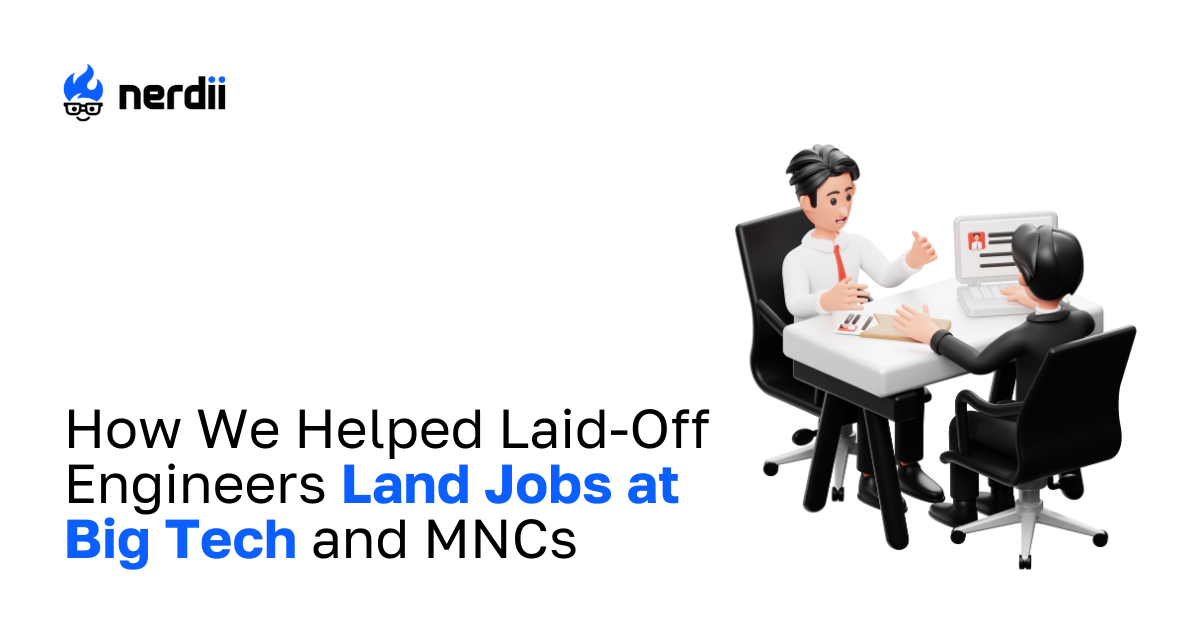
In 2024, the technology sector faced unprecedented challenges, leading to significant layoffs across various companies. According to TechCrunch, over 150,000 jobs were cut across 542 companies during this period. This wave of layoffs left many skilled engineers seeking new opportunities, often competing in a saturated job market.
Amidst this challenging landscape, Nerdii emerged as a beacon of hope for many displaced engineers. By leveraging advanced AI technology and personalized support, Nerdii assisted numerous professionals in securing positions at leading tech firms and multinational corporations (MNCs). This article delves into how Nerdii’s innovative approach facilitated successful career transitions for laid-off engineers.
The year 2024 proved to be one of the most volatile periods for the global tech industry. As economic uncertainties, inflation concerns, and restructuring efforts took hold, some of the world’s largest tech giants, Google, Amazon, Microsoft, Meta, and others, announced large-scale layoffs.
According to Layoffs.fyi, over 150,000 tech employees were let go from 549 companies in 2024 alone. This followed the mass layoffs of 2023, during which companies attempted to scale down after the pandemic-driven hiring boom. By early 2025, tech job cuts showed no sign of slowing, with major firms continuing to restructure in response to shifting business needs.
So far, 22,692 tech employees layoffs have been seen across 81 tech companies in 2025.
The layoffs stemmed from several key factors:
While layoffs impacted professionals across the board, certain groups bore the brunt more than others:
For many engineers, these layoffs were more than just a career setback. They had significant emotional and financial consequences. The uncertainty of the job market left many professionals struggling with anxiety and stress, especially those who had built their lives around stable tech careers.
With thousands of highly skilled professionals suddenly looking for work, competition became fiercer than ever. Many job seekers found themselves applying to hundreds of positions without receiving any responses, leading to frustration and discouragement.
The hiring landscape is undergoing a major transformation, driven by advancements in technology, shifts in employer expectations, and the growing role of artificial intelligence. As companies continue to refine their hiring processes, job seekers (especially those in tech) are facing a hyper-competitive job market where automated systems, AI-powered evaluations, and skill-based hiring determine success. Mass applications don’t work anymore.
With mass layoffs in the tech industry, thousands of highly experienced professionals are competing for fewer job openings. In 2024 alone, over 150,000 tech workers lost their jobs, intensifying competition across all levels. Even candidates with strong technical backgrounds and years of experience are struggling to differentiate themselves in a crowded job market.
Companies now rely heavily on Applicant Tracking Systems (ATS) and AI-powered recruitment tools to sift through thousands of applications. These systems automatically filter candidates based on keywords, formatting, and experience, often rejecting 75% of resumes before a human even sees them. Candidates who fail to optimize their resumes for ATS compliance risk being overlooked, no matter how qualified they are.
Employers are moving away from degree-based hiring and prioritizing practical skills, certifications, and technical assessments instead. A computer science degree alone is no longer enough. Candidates must demonstrate hands-on expertise through coding tests, GitHub projects, and real-world applications of AI, cloud computing, and software engineering.
AI isn’t just screening resumes; it’s now conducting initial interview rounds, analyzing behavioral patterns, and predicting a candidate’s likelihood of success in a role. Job seekers must learn how to navigate these AI-driven hiring processes by optimizing responses, demonstrating adaptability, and standing out in automated evaluations.
While remote work offers more flexibility, it also means candidates aren’t just competing locally anymore; they’re up against skilled engineers from around the world. Companies can now source talent from lower-cost regions, making it even harder for job seekers to stand out in traditional hiring pools.
With hiring becoming more data-driven and AI-dominated, job seekers need a smarter, more strategic approach, and that’s where Nerdii comes in.
As the hiring process continues to evolve, job seekers must adapt. With Nerdii’s expertise, they can stay ahead of the competition and land roles at top tech companies and MNCs.
Recognizing the challenges faced by laid-off engineers, Nerdii set out with a clear mission: to streamline the job search process and enhance employability through technological innovation and expert guidance. Central to Nerdii’s approach are several key strategies:
Nerdii’s contributions extend beyond individual success stories. By addressing the challenges posed by mass layoffs, Nerdii plays a pivotal role in:
The tech industry’s volatility in 2024 underscored the need for adaptive solutions to employment challenges. Nerdii’s blend of AI technology and personalized support has proven instrumental in helping laid-off engineers secure positions at top tech companies and MNCs. As the industry continues to evolve, platforms like Nerdii will remain essential in bridging the gap between talent and opportunity, ensuring that skilled professionals can navigate their career paths with confidence and resilience.
The best way to get job interviews in 2025 is acknowledging that independent job...
Our success rates significantly exceed national averages because our process add...
Nerdii's ATS optimization begins with comprehensive technical analysis that ensu...